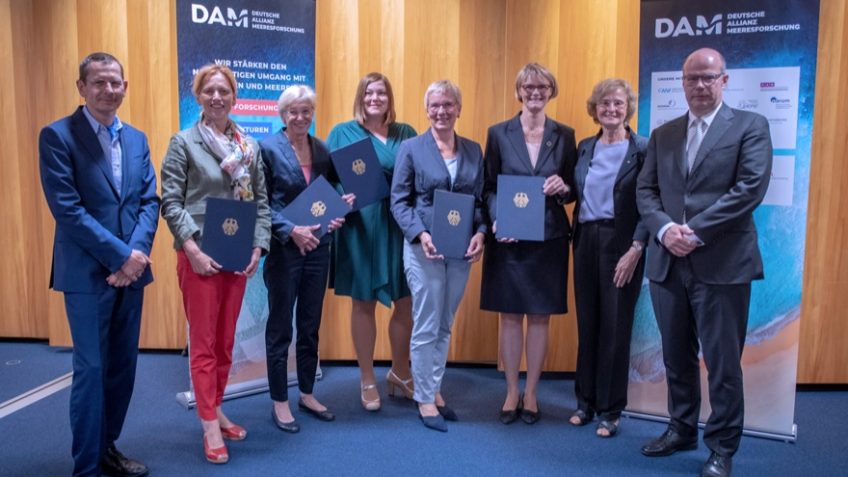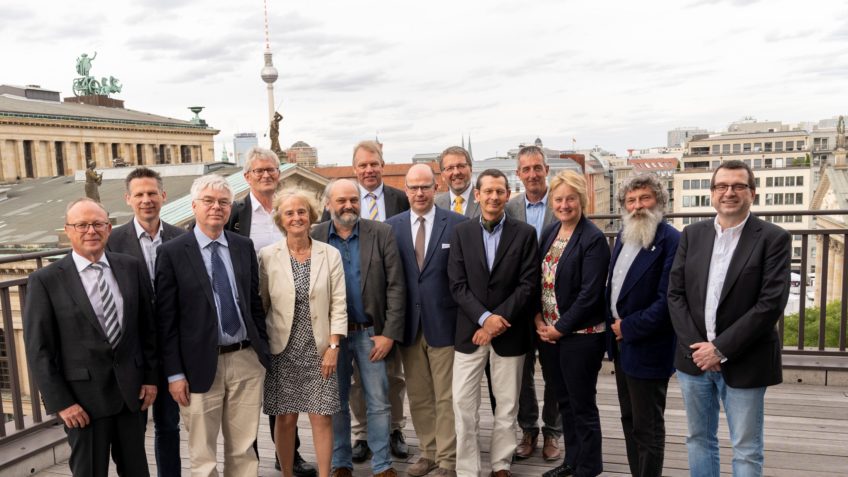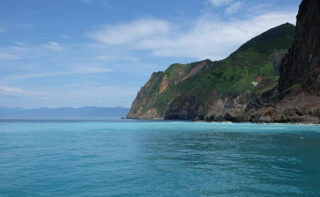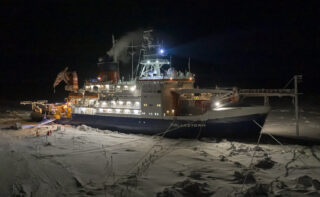German Marine Research Alliance Kicks Off
Administrative agreement enters into force
The German Marine Research Alliance (DAM) has kicked off. With their signatures, the Federal Minister of Education and Research Anja Karliczek, Bremen’s Science Senator Eva Quante-Brandt, Hamburg’s Science Senator Katharina Fegebank, the Ministers of Science for Schleswig-Holstein and Mecklenburg-Western Pomerania, Karin Prien and Bettina Martin, and Lower Saxony’s State Secretary Sabine Johannsen put into force the administrative agreement to set up and promote the DAM on 18 July.
This creates one of the world’s largest marine research alliances, whose goal is to develop a solution-oriented knowledge base for taking action in pursuing the sustainable management of the seas and oceans. The German federal government and the five northern German states of Bremen, Hamburg, Mecklenburg-Western Pomerania, Lower Saxony and Schleswig-Holstein are jointly providing 56.25 million euros in funding for this purpose until 2022. The federal government is covering 80 percent of the costs, while the individual states together are contributing the remaining 20 percent.

Science for the sustainable use of the seas and oceans
Federal Minister of Education and Research, Anja Karliczek, emphasised that, “The German Marine Research Alliance will bring together the expertise of research facilities and universities under a single roof. This is more important than ever, because the marine and climate sciences are making a decisive contribution to safeguarding our future. The German Marine Research Alliance is to provide a knowledge-base for action on issues that are relevant to society – such as marine biodiversity and mitigating climate change. It is no coincidence that the oceans are considered to be the climate engine of our planet. The German Marine Research Alliance will help us to gain an even better understanding of the vital role that the seas and oceans play, and become a source of valuable information when it comes to shaping our future.”
“The individual states are motivated to join the German Marine Research Alliance by the desire to channel the tremendous know-how that exists at North German research facilities in order to find answers to the pressing questions of marine research, with a view to securing and consolidating our top international position,” said Bremen’s Science Senator Eva Quante-Brandt.
The five northern German states are key centres of German marine research. The DAM will bring together universities and other research facilities, such as Helmholtz Centres, Leibniz and Max Planck Institutes, permitting them to jointly carry out top-class research at the highest international level. The Helmholtz Association of German Research Centres (Helmholtz-Gemeinschaft Deutscher Forschungszentren e.V.) is providing fundamental support and assistance to the DAM and its offices by setting up the necessary interconnected data infrastructure that will permit new findings to be extracted from the research data collected.
Founding of the association in Berlin: solidly grounded in science
The German Marine Research Alliance was itself established in the legal form of a registered association, on 4 July in Berlin, by the following thirteen institutions: the Alfred Wegener Institute Helmholtz Centre for Polar and Marine Research (AWI), the Carl von Ossietzky University in Oldenburg with its Institute for the Chemistry and Biology of the Marine Environment (ICBM), the Christian Albrecht University in Kiel (CAU) with its Kiel Marine Science (KMS), GEOMAR Helmholtz Centre for Ocean Research Kiel, the Helmholtz Centre Geesthacht – Centre for Materials and Coastal Research (HZG), the Leibniz Institute for Baltic Research Warnemünde (IOW), the Leibniz Centre for Tropical Marine Research (ZMT), MARUM – Centre for Marine Environmental Sciences at the University of Bremen, the Max Planck Society for the Advancement of Science e.V.(MPG) with the Max Planck Institute for Marine Microbiology (MPI-MM) and the Max Planck Institute for Meteorology (MPI-M), the Senckenberg Society for Nature Research with Senckenberg am Meer, the University of Hamburg with the Centre for Earth System Research and Sustainability (CEN), and the University of Rostock with its Department of Maritime Systems (MTS).

Board elected for four years
The presidents and directors of the member institutions signed the statutes on 4 July and elected the Executive Board. The full-time chairman of the board is Michael Bruno Klein, who has been actively involved in science management for over 20 years, holding the offices of Secretary General of the Leibniz Association and Secretary General of acatech – the German Academy of Science and Engineering. His deputy is Michael Schulz, Director of MARUM – Centre for Marine Environmental Sciences at the University of Bremen. Karin Lochte, former Director of the Alfred Wegener Institute Helmholtz Centre for Polar and Marine Research (AWI), and Peter Herzig, Director of the GEOMAR Helmholtz Centre for Ocean Research in Kiel, are also members of the board, which has been elected for a period of four years.
Research missions under development and exchange with stakeholders
Within the context of the DAM, research missions are currently being developed to address socially relevant issues in marine research and to develop a more comprehensive understanding to inform action for the sustainable management of the oceans.
Following the DAM Science Conference in February, at which four outlines of topics for research missions were presented, a number of discussions and meetings with DAM members, participating scientists, funding agencies and the Jülich management took place in order to agree on criteria and prerequisites for the further elaboration of the research missions. The focus was on how to achieve a stronger solutions orientation and on offering users concrete options for action. As a result, two research missions were prioritized: “Protection and Use of Marine Areas” and “Future of Marine Carbon Sinks – Knowledge for Action in Climate Policy”.
Research Mission: Protection and Use of Marine Areas
The thematic outline “Protection and Use of Marine Areas” has been expanded to include key aspects of the mission proposals “Biodiversity – Scenarios, Tools and Proposed Solutions” and “Oceans in the Chemical Anthropocene”. In order to preserve species diversity and ecosystem functionality, the research mission will also examine the effectiveness of protection mechanisms – especially in marine protected areas – initially with a regional focus on the North Sea and Baltic Sea, drawing comparisons with West Africa.
In order to involve users and stakeholders in the development of the research projects at an early stage, a stakeholder workshop dealing with this mission was held on 1 July at the Science Forum in Berlin with over 40 participants from public authorities, politics and science. The suggestions made by the stakeholders will be taken into consideration in the further design of the research mission.
Research Mission: Marine Carbon Sinks
This research mission deals with the contribution that oceans are making towards limiting climate change by absorbing CO2 emissions and the ways in which this contribution could be maintained and perhaps even increased through carbon management.
Users and stakeholders are also involved in this mission. A stakeholder workshop to be held on 28 August at the Climate Service Centre Germany (GERICS) in Hamburg will discuss the contexts in which the potential research findings are relevant for decisions and the development of measures to achieve the Paris climate goals.
On 1 September, Annekatrin Lehmann will take office as a research consultant to the DAM office to support the further development of the research missions and application procedure, and to facilitate and coordinate the exchange with stakeholders.
Data Management: Launch of the pilot project on underway research data
The aim of the core area Data Management and Digitisation is to make systematically collected marine research data openly and sustainably accessible and to use the existing data infrastructure more effectively and efficiently.
Using start-up funding of € 3m from the Helmholtz residual pact funds, underway research data from the research vessels MERIAN, METEOR, POLARSTERN and SONNE is to be systematically developed, sustainably secured and made openly accessible and (inter)nationally connected.
At the end of June, the BMBF approved the project duration of 1.5 years (7/2019-12/2020). The eleven positions applied for in the areas of IT/development and research data management at the partner institutions (AWI, CAU, CEN, GEOMAR, HZG, ICBM, IOW and MARUM) have already been advertised and can now be quickly filled. With this, the project is moving from the planning to the implementation phase. In regular workshops, the progress of the sub-projects is being communicated to the partners, documented, checked and, if necessary, adjusted in order to achieve the project goals.
Networking within the National Research Data Infrastructure (NDFI)
The NFDI is to systematically develop and sustainably secure data from science and research, and make it accessible and connected (inter-)nationally. It is currently being established as an interconnected assembly of consortia in a science-driven process. The DAM intends to contribute to the process by providing NFDI with high-quality and harmonised marine research data. The actors from the DAM are involved in setting up the consortia NFDI4Earth and NFDI4Biodiversity.
DAM in the media
The political launch on 18 July in Bonn also marked the beginning of the DAM’s press and public relations work. The proactive DAM press activities began with a press release jointly issued by the BMBF, the DAM and the North German states. It was picked up by the news agency dpa, several North German media, the national newspaper WELT and by Deutschlandfunk and NDR radio.
Outlook
The DAM will not be taking much of a summer break, because the Alliance is now ready to get underway. The next steps will include setting up the DAM’s committees. A constituent meeting of the Administrative Council, with representatives of the federal and state funding agencies, is scheduled, as is a first General Assembly. In addition, members of the International Advisory Council, DAM’s technical advisory body, will be selected and invited to attend.
Newsletter
Always up to date with the DAM newsletter. (German only)



